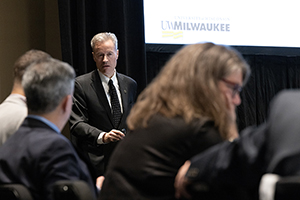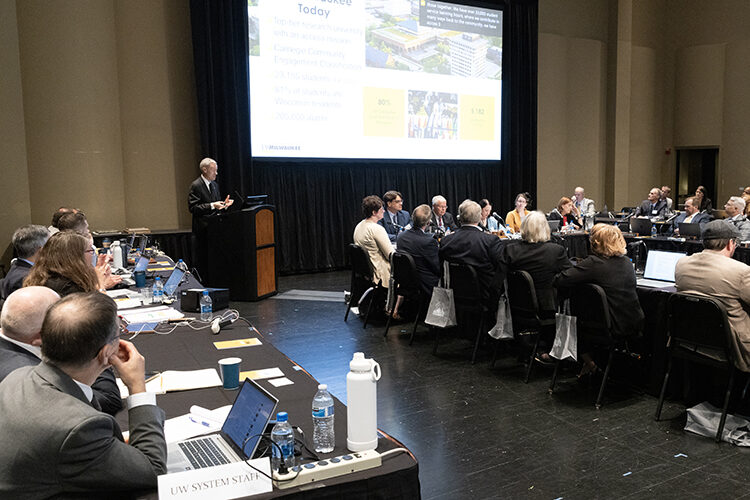A network of educational and community partnerships that UWM helped establish is beginning to show powerful results toward the goal of improving the economic trajectory of people of color through educational attainment, Chancellor Mark Mone told members of the UW System Board of Regents Thursday.
Mone hosted a panel discussion with representatives of five area partnerships, which collectively aim to knit together resources and conduct research into best practices to remove obstacles and close the racial achievement gaps in education at various levels.
The partnerships – M3, the Higher Education Regional Alliance (HERA), Moon Shot for Equity, the Hispanic Collaborative and the Metropolitan Milwaukee Association of Commerce – are united by a desire to better prepare students of color for higher education, improve their graduation rates and diversify the workforce, while increasing the pipeline of talent into the workplace.

In a discussion about how the UW System can turn out enough college graduates to fill the more than 100,000 jobs that require a college degree in the next few years, Mone said the need is particularly urgent to boost the number of the state’s Black and Hispanic graduates. The college graduation rates of those populations stand at 14%, compared to the white graduation rate of 38%.
But Mone added that accomplishing those goals will not only lift people out of poverty and address a workforce need, but it can also dramatically extend life expectancies for people of color, which he called a “moral imperative.” He shared data that showed residents in the low-income 53206 ZIP code had a life expectancy 11 years lower than those in the 53217 ZIP code, where poverty is low and most residents are college-educated.
“Those determinants of health are working against these populations without educational attainment,” Mone said. “So what are we doing about this? There’s so much more muscle, there’s so much more firepower, when we work together. These partnerships are creating knowledge, resolving problems, securing federal funding – all necessary to be able to address inequities at scale.”
Panel participants, some who have worked on multiple partnership programs, included:
- Former UW-Parkside Chancellor Debbie Ford
- Milwaukee Public Schools Superintendent Keith Posley
- Mohammad Dakwar, vice president of learning, Milwaukee Area Technical College
- Tim Sheehy, Metropolitan Milwaukee Association of Commerce president
- Nancy Hernandez, president of the Hispanic Collaborative of Milwaukee
Higher Education Regional Alliance
HERA formed in 2018 under the premise that the challenge of meeting the diverse needs of employers in southeastern Wisconsin requires a response from more than just one college or university. There are 18 partners, working on reducing skill gaps and providing an educated workforce. One of those is the Hispanic Collaborative, which is working to improve the economic status of Latinos.
“Our partnership with HERA has helped us with programs like one that is moving low-income, low-skilled workers into higher earning, high-demand positions, such as cybersecurity and certified nursing assistants,” said Hernandez. “We are upscaling 100 Latinos a year in partnership with MATC, UW-Whitewater, and we are getting ready to scale this to be able to reach 1,000 Latinos per year in the next three years.”
Moon Shot for Equity
This national program designed to eliminate the achievement gap between white students and underrepresented minorities by 2030. UWM joined the program with Carthage College, MATC and UW-Parkside in 2020.
“Milwaukee and Racine counties are ranked as the worst communities for African Americans,” said Ford, who worked on the initiative. “When we first entered the discussions from Moon Shot for Equity, we kept hearing from our colleagues on our campuses that they already had these practices. But the data had told a different story.”
Today, Ford said, the involved campuses have used software tools like Navigate to identify administrative and other curricular barriers to the success of students of color. The partners have conducted climate surveys and shared what they’ve learned.
M3 (pronounced M-Cubed)
Through M3, MPS students can take some college courses at MATC or UWM for credit during their senior year in high school. Since the pilot courses started in 2019, 529 high school students have earned 6,756 credits, according to M3 figures.
The program also focuses on building individual student career plans after high school. Participants in M3 also get help with the college financial aid applications and host a six-week course for parents on preparing their children for the transition from high school to college.
As a result of the program, said Posley, “we are pulling the curriculum together so that students don’t have that math gap when they get to the college level. And having a number of college credits at their high school graduation is saving young people money in earning their degrees.”
M3 is behind a noticeable jump in retention of MATC students, leading to increasing graduation rates, said Dakwar. And there is strong interest from students in joining.
These partnerships are opening doors with philanthropic organizations and area businesses that share in the vision of improving diversity in higher education, Mone said.
Last summer Mone and Sheehy brought together a group of employers interested in boosting diversity and talent with a pool of students from underrepresented backgrounds looking for internships and work experience. The program recently was expanded with funding from the state Department of Workforce Development.
“It was almost like NFL draft day – employers were connected with diverse students looking for hands-on internships,” Sheehy said. “The CEO of Eaton Corp. emailed me and said ‘I feel like I got five first round brackets. This is fantastic.’”






